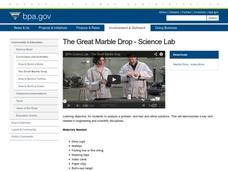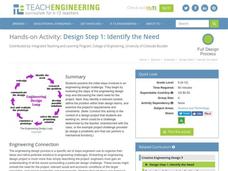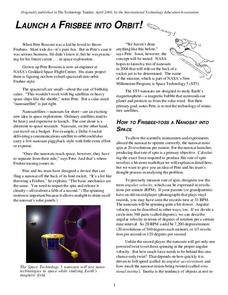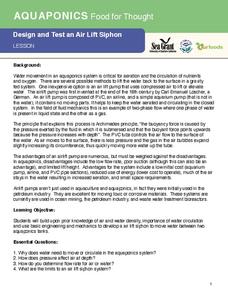Institute of Electrical and Electronics Engineers
Get it Write
In an effort to practice engineering design, STEM classes break out into teams and endeavor to make a working ink pen. To prepare, they read about writing implements through history, patents, and viscosity of liquids. Armed with this...
Bonneville
The Great Marble Drop
Mike and Kellie, a team of electrical engineers, demonstrate how to to design a contraption that accurately drops a marble onto a target. The materials needed and general instructions are provided on the website or via a downloadable...
Mascil Project
The Pipe Clamp
Clamp onto the resource and don't let go. Future mechanical engineers produce a pipe clamp from a sheet of metal. This idea is to use the pipe clamp to affix a pull-up bar in a doorway.
Teach Engineering
Levers that Lift
Introduce your class to to the remaining three simple machines-- the lever, pulley, and the wheel-and-axle with a plan that includes the three different types of levers in the discussion of levers. The lesson continues with the...
Autodesk
AutoCAD 360
Take your drafting and design projects on the go with with this mobile computer-aided design program. Allowing users to view, edit, and share their work with others, this is a great resource for developing the technical drawing...
Curated OER
Roller Coasters
Twisting and turning through the sky, roller coasters are popular attractions at amusement parks around the world, but how exactly do they work? Explore the physics behind these thrilling rides with an engineering design activity....
Institute of Electrical and Electronics Engineers
Pendulum Time
Take your time with this lesson. Junior engineers read about different types of clocks and then work together to build a pendulum time-keeper. There are no hints as to how they might go about accomplishing this complex task, so you may...
Teach Engineering
Off-Road Wheelchair Challenge
Challenge your class to use their understanding of the engineering design process to design and build a small-scale, off-road prototype for an assistive technology device. Teams select materials to build their scale models, and, using...
Rochester Institue of Technology
Ergonomic Design
To an engineer, the glass is never half full; it's just double the necessary size. The fifth installment of a nine-part technology and engineering series teaches pupils about the idea of ergonomic design. Measurements of popliteal height...
NOAA
Oceans of Energy
Are the earth's oceans really just giant batteries, waiting for their energy to be harnessed? Middle school mechanical engineers will be shocked by the amazing amount of energy that forms around them after diving into part four of a...
Teach Engineering
Machines and Tools (Part 2)
Which pulley system will give us a whale of a good time? Teams compare the theoretical and actual mechanical advantages of different pulley systems. They then form a recommendation for how to move a whale from an aquarium back to the ocean.
DiscoverE
Product Dissection
Sometimes, taking things apart is more fun than putting things together. Groups of learners participate in a reverse engineering activity. They dissect a device of their choosing to see how it works—great hands-on learning from the...
Teach Engineering
Design Step 1: Identify the Need
What exactly does an engineer do? Learners find out through a lesson that asks them to solve a problem that affects a target population. Aspiring engineers learn the steps of the engineering design process as they apply it...
Teach Engineering
Energy Storage Derby and Proposal
Small groups use the engineering design process to build and test a vehicle capable of carrying 250 grams a distance of five meters. The design must allow for the storage of potential energy and turn it into motion,...
DiscoverE
Hidden Alarm
It's time to wake up! Young engineers build an electric circuit that will activate an alarm. The use of switches in the circuit is a must—because you don't want the alarm to keep beeping forever!
Institute of Electrical and Electronics Engineers
History of Computing – EEEEK- A Mouse!
Students examine the concepts of computer and mechanical engineering. They dissemble a computer mouse and create a new design for the mouse. They also design new enhancements for the mouse over time.
International Technology Education Association
Launch a Frisbee into Orbit!
How fun it must be to play Frisbee in space! That is just what a NASA engineer gets to do, and you can learn how, too. Follow the instructions provided in this informational article to create your own satellite launcher. Afterward,...
Teach Engineering
Linking Sources and Pollutants
Class members use an air quality monitor to measure the amount of gas-phase pollutants emitted by different sources. Groups choose three different sources and make predictions about what the monitors will detect. Teams then expose...
DiscoverE
Design a Folding Solar Panel
Solar energy is an amazing alternative ... but, not always particularly portable! Challenge young scientists to a folding solar panel build-off with an easy-to-execute activity. Scholars brainstorm around specific design needs, construct...
DiscoverE
A Leg to Stand On
Give your learners a leg up in their study of engineering. Groups design and create a prothestic for a leg. They test out their designs for strength, stability, durability, and comfort.
Teach Engineering
Tools and Equipment (Part 1)
Looking for the best inclined plane for the job? Groups calculate the theoretical mechanical advantage for four different inclined planes. They determine the actual mechanical advantage by measuring the amount of force needed for the...
Institute of Electrical and Electronics Engineers
Wind Tunnel Testing
One of the factors that automotive engineers must consider is wind drag. The less wind drag, the more efficient the car will be. They perform many tests in wind tunnels, then refine their designs and test again. Using simple materials,...
PBS
Robo Arm
Future engineers create robotic arms like those on rovers built by NASA in the second instructional activity of the series. They test their devices by attempting to pick up and move cups to a specified location.
University of Southern California
Design and Test an Air Lift Siphon
Build an air lift siphon using your mad physics skills! Learners first investigate the importance of circulating water in aquaponics systems. They then use density to their advantage as they engineer an air lift siphon





















